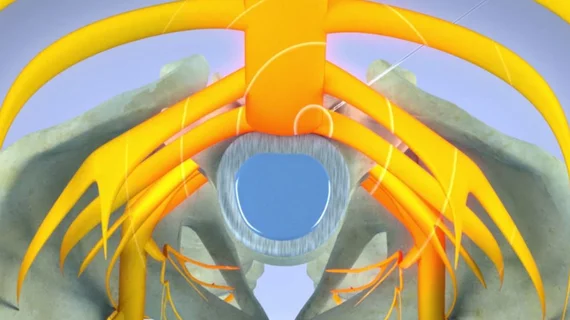RSNA 2018: CT-guided treatment aids back pain, sciatica patients
Treatment that delivers pulses of energy directly to nerves near the spine is a safe and effective procedure in patients with acute lower back pain, according to research presented Tuesday, Nov. 27, at RSNA 2018 in Chicago. The method may help patients who have not responded to conservative treatments.
A team of researchers, led by Alessandro Napoli, MD, PhD, of Sapienza University in Rome, tested CT-guided pulsed radiofrequency (pRF) in 128 patients with back pain from lumbar disk herniation that hadn’t responded to conservative treatment. Napoli and colleagues applied pRF, which delivers CT-guided energy pulses, to the root of the nerve for 10 minutes. Another 120 participants received one to three sessions of CT-guided steroid injection with no pRF.
Overall, the CT-guided pRF one-year outcomes outperformed the injection strategy, with those who received pulsed radiofrequency reporting improvement in pain and disability scores. Additionally, pRF patients noted faster leg pain relief and quicker perceived recovery times. Those in the pRF group had a 95 percent probability of perceived recovery after one year of follow-up, compared to 61 percent in the injection cohort.
“Given our study results, we offer pulsed radiofrequency to patients with herniated disk and sciatic nerve compression whose symptoms do not benefit from conservative therapy,” Napoli said in a prepared statement from RSNA.
Those conservative treatments include anything from over-the-counter medications to corticosteroid injections. If those options don’t work, many require surgery, and in some cases need the entire herniated disk to be removed and vertebra fused together.
Napoli and colleagues believe their results could help patients with sciatic disk compression avoid invasive surgery and improve outcomes in groups scheduled to receive corticosteroid injections.
“Of the different therapies available, pulsed radiofrequency is among the least invasive,” Napoli said. “Treatment lasts 10 minutes, and one session was enough in a large number of treated patients."

